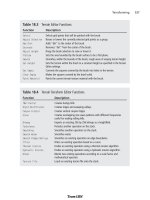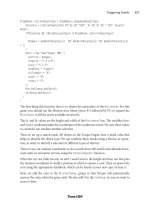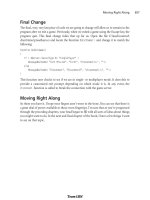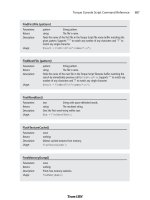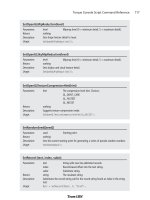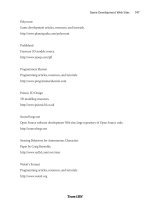Tài liệu 3D Game Programming All in One- P12 doc
Bạn đang xem bản rút gọn của tài liệu. Xem và tải ngay bản đầy đủ của tài liệu tại đây (414.41 KB, 30 trang )
Exec("./server/missionDownload.cs");
Exec("./server/clientConnection.cs");
Exec("./server/kickban.cs");
Exec("./server/game.cs");
}
//
package Common {
function DisplayHelp() {
Parent::DisplayHelp();
Error(
"Common Mod options:\n"@
" -fullscreen Starts game in full screen mode\n"@
" -windowed Starts game in windowed mode\n"@
" -autoVideo Auto detect video, but prefers OpenGL\n"@
" -openGL Force OpenGL acceleration\n"@
" -directX Force DirectX acceleration\n"@
" -voodoo2 Force Voodoo2 acceleration\n"@
" -noSound Starts game without sound\n"@
" -prefs <configFile> Exec the config file\n"
);
}
function ParseArgs()
{
Parent::ParseArgs();
// Arguments override defaults
for (%i = 1; %i < $Game::argc ; %i++)
{
%arg = $Game::argv[%i];
%nextArg = $Game::argv[%i+1];
%hasNextArg = $Game::argc - %i > 1;
switch$ (%arg)
{
//
case "-fullscreen":
$pref::Video::fullScreen = 1;
$argUsed[%i]++;
Game Initialization 237
Team LRN
Please purchase PDF Split-Merge on www.verypdf.com to remove this watermark.
//
case "-windowed":
$pref::Video::fullScreen = 0;
$argUsed[%i]++;
//
case "-noSound":
error("no support yet");
$argUsed[%i]++;
//
case "-openGL":
$pref::Video::displayDevice = "OpenGL";
$argUsed[%i]++;
//
case "-directX":
$pref::Video::displayDevice = "D3D";
$argUsed[%i]++;
//
case "-voodoo2":
$pref::Video::displayDevice = "Voodoo2";
$argUsed[%i]++;
//
case "-autoVideo":
$pref::Video::displayDevice = "";
$argUsed[%i]++;
//
case "-prefs":
$argUsed[%i]++;
if (%hasNextArg) {
Exec(%nextArg, true, true);
$argUsed[%i+1]++;
%i++;
}
else
Error("Error: Missing Command Line argument. Usage: -prefs
<path/script.cs>");
}
Chapter 7
■
Common Scripts238
Team LRN
Please purchase PDF Split-Merge on www.verypdf.com to remove this watermark.
}
}
function OnStart()
{
Parent::OnStart();
Echo("\n Initializing MOD: Common ");
InitCommon();
}
function OnExit()
{
Echo("Exporting client prefs");
Export("$pref::*", "./client/prefs.cs", False);
Echo("Exporting server prefs");
Export("$Pref::Server::*", "./server/prefs.cs", False);
BanList::Export("./server/banlist.cs");
OpenALShutdown();
Parent::OnExit();
}
}; // Common package
activatePackage(Common);
Two key things that happen during game initialization are calls to
InitBaseServer
and
InitBaseClient
, both of which are defined in common/main.cs. These are critical func-
tions, and yet their actual activities are not that exciting to behold.
function InitBaseServer()
{
Exec("./server/audio.cs");
Exec("./server/server.cs");
Exec("./server/message.cs");
Exec("./server/commands.cs");
Exec("./server/missionInfo.cs");
Exec("./server/missionLoad.cs");
Exec("./server/missionDownload.cs");
Exec("./server/clientConnection.cs");
Exec("./server/kickban.cs");
Exec("./server/game.cs");
}
Game Initialization 239
Team LRN
Please purchase PDF Split-Merge on www.verypdf.com to remove this watermark.
function InitBaseClient()
{
Exec("./client/message.cs");
Exec("./client/mission.cs");
Exec("./client/missionDownload.cs");
Exec("./client/actionMap.cs");
Exec("./editor/editor.cs");
Exec("./client/scriptDoc.cs");
}
As you can see, both are nothing more than a set of script loading calls. All of the scripts
loaded are part of the common code base. We will look at selected key modules from these
calls in the rest of this section.
Selected Common Server Modules
Next, we will take a close look at some of the common code server modules. The modules
selected are the ones that will best help illuminate how Torque operates.
The Server Module
InitBaseServer
loads the common server module, server.cs. When we examine this mod-
ule we see the following functions:
PortInit
CreateServer
DestroyServer
ResetServerDefaults
AddToServerGuidList
RemoveFromServerGuidList
OnServerInfoQuery
It's not hard to get the sense from that list that this is a pretty critical module!
PortInit
tries to seize control of the assigned TCP/IP port, and if it can't, it starts incre-
menting the port number until it finds an open one it can use.
CreateServer
does the obvious, but it also does some interesting things along the way.
First, it makes a call to
DestroyServer!
This is not as wacky as it might seem; while
DestroyServer
does release and disable resources, it does so only after making sure the
resources exist. So there's no danger of referencing something that doesn't exist, which
would thus cause a crash. You need to specify the server type (single- [default] or multi-
player) and the mission name. The
PortInit
function is called from here, if the server will
Chapter 7
■
Common Scripts240
Team LRN
Please purchase PDF Split-Merge on www.verypdf.com to remove this watermark.
be a multiplayer server. The last, but certainly not the least, thing that
CreateServer
does
is call
LoadMission
. This call kicks off a long and somewhat involved chain of events that
we will cover in a later section.
DestroyServer
releases and disables resources, as mentioned, and also game mechanisms.
It stops further connections from happening and deletes any existing ones; turns off the
heartbeat processing; deletes all of the server objects in
MissionGroup
,
MissionCleanup
, and
ServerGroup
; and finally, purges all datablocks from memory.
ResetServerDefaults
is merely a convenient mechanism for reloading the files in which the
server default variable initializations are stored.
AddToServerGuidList
and
RemoveFromServerGuidList
are two functions for managing the list
of clients that are connected to the server.
OnServerInfoQuery
is a message handler for handling queries from a master server. It merely
returns the string
"Doing OK"
. The master server, if there is one, will see this and know that
the server is alive. It could say anything—there could even be just a single-space character
in the string. The important point is that if the server is not doing okay, then the function
will not even be called, so the master server would never see the message, would time out,
and then would take appropriate action (such as panicking or something useful like that).
The Message Module
InitBaseServer
loads the common server-side message module, message.cs. Most of this
module is dedicated to providing in-game chat capabilities for players.
MessageClient
MessageTeam
MessageTeamExcept
MessageAll
MessageAllExcept
ChatMessageClient
ChatMessageTeam
ChatMessageAll
SpamAlert
GameConnection::SpamMessageTimeout
GameConnection::SpamReset
The first five functions in the preceding list are for sending server-type messages to indi-
vidual clients, all clients on a team, and all clients in a game. There are also exception mes-
sages where everyone is sent the message except a specified client.
Selected Common Server Modules 241
Team LRN
Please purchase PDF Split-Merge on www.verypdf.com to remove this watermark.
Next are the three chat message functions. These are linked to the chat interfaces that play-
ers will use to communicate with each other.
These functions all use the
CommandToServer
(see Chapter 6) function internally. It is impor-
tant to note that there will need to be message handlers for these functions on the client side.
The three spam control functions are used in conjunction with the chat message func-
tions.
SpamAlert
is called just before each outgoing chat message is processed for sending.
Its purpose is to detect if a player is swamping the chat window with messages—this
action is called spamming the chat window. If there are too many messages in a short time
frame as determined by the
SpamMessageTimeout
method, then the offending message is
suppressed, and an alert message is sent to the client saying something like this: "Enough
already! Take a break." Well, you could say it more diplomatically than that, but you get
the idea.
SpamReset
merely sets the client's spam state back to normal after an appropri-
ately silent interval.
The MissionLoad Module
Torque has a concept of mission that corresponds to what many other games, especially
those of the first-person shooter genre, call maps. A mission is defined in a mission file
that has the extension of .mis. Mission files contain the information that specifies objects
in the game world, as well as their placement in the world. Everything that appears in the
game world is defined there: items, players, spawn points, triggers, water definitions, sky
definitions, and so on.
Missions are downloaded from the server to the client at mission start time or when a
client joins a mission already in progress. In this way the server has total control over what
the client sees and experiences in the mission.
Here are the contents of the common/server/missionload.cs module.
//
// Torque Game Engine
//
// Copyright (c) 2001 GarageGames.com
// Portions Copyright (c) 2001 by Sierra Online, Inc.
//
//
// Server mission loading
//
// On every mission load except the first, there is a pause after
// the initial mission info is downloaded to the client.
Chapter 7
■
Common Scripts242
Team LRN
Please purchase PDF Split-Merge on www.verypdf.com to remove this watermark.
$MissionLoadPause = 5000;
function LoadMission( %missionName, %isFirstMission )
{
EndMission();
Echo("*** LOADING MISSION: " @ %missionName);
Echo("*** Stage 1 load");
// Reset all of these
ClearCenterPrintAll();
ClearBottomPrintAll();
// increment the mission sequence (used for ghost sequencing)
$missionSequence++;
$missionRunning = false;
$Server::MissionFile = %missionName;
// Extract mission info from the mission file,
// including the display name and stuff to send
// to the client.
BuildLoadInfo( %missionName );
// Download mission info to the clients
%count = ClientGroup.GetCount();
for( %cl = 0; %cl < %count; %cl++ ) {
%client = ClientGroup.GetObject( %cl );
if (!%client.IsAIControlled())
SendLoadInfoToClient(%client);
}
// if this isn't the first mission, allow some time for the server
// to transmit information to the clients:
if( %isFirstMission || $Server::ServerType $= "SinglePlayer" )
LoadMissionStage2();
else
schedule( $MissionLoadPause, ServerGroup, LoadMissionStage2 );
}
function LoadMissionStage2()
{
// Create the mission group off the ServerGroup
Echo("*** Stage 2 load");
Selected Common Server Modules 243
Team LRN
Please purchase PDF Split-Merge on www.verypdf.com to remove this watermark.
$instantGroup = ServerGroup;
// Make sure the mission exists
%file = $Server::MissionFile;
if( !IsFile( %file ) ) {
Error( "Could not find mission " @ %file );
return;
}
// Calculate the mission CRC. The CRC is used by the clients
// to cache mission lighting.
$missionCRC = GetFileCRC( %file );
// Exec the mission, objects are added to the ServerGroup
Exec(%file);
// If there was a problem with the load, let's try another mission
if( !IsObject(MissionGroup) ) {
Error( "No 'MissionGroup' found in mission \"" @ $missionName @ "\"." );
schedule( 3000, ServerGroup, CycleMissions );
return;
}
// Mission cleanup group
new SimGroup( MissionCleanup );
$instantGroup = MissionCleanup;
// Construct MOD paths
PathOnMissionLoadDone();
// Mission loading done
Echo("*** Mission loaded");
// Start all the clients in the mission
$missionRunning = true;
for( %clientIndex = 0; %clientIndex < ClientGroup.GetCount(); %clientIndex++ )
ClientGroup.GetObject(%clientIndex).LoadMission();
// Go ahead and launch the game
OnMissionLoaded();
PurgeResources();
Chapter 7
■
Common Scripts244
Team LRN
Please purchase PDF Split-Merge on www.verypdf.com to remove this watermark.
}
function EndMission()
{
if (!IsObject( MissionGroup ))
return;
Echo("*** ENDING MISSION");
// Inform the game code we're done.
OnMissionEnded();
// Inform the clients
for( %clientIndex = 0; %clientIndex < ClientGroup.GetCount(); %clientIndex++ ) {
// clear ghosts and paths from all clients
%cl = ClientGroup.GetObject( %clientIndex );
%cl.EndMission();
%cl.ResetGhosting();
%cl.ClearPaths();
}
// Delete everything
MissionGroup.Delete();
MissionCleanup.Delete();
$ServerGroup.Delete();
$ServerGroup = new SimGroup(ServerGroup);
}
function ResetMission()
{
Echo("*** MISSION RESET");
// Remove any temporary mission objects
MissionCleanup.Delete();
$instantGroup = ServerGroup;
new SimGroup( MissionCleanup );
$instantGroup = MissionCleanup;
//
OnMissionReset();
}
Selected Common Server Modules 245
Team LRN
Please purchase PDF Split-Merge on www.verypdf.com to remove this watermark.
Here are the mission loading–oriented functions on the server contained in this module:
LoadMission
LoadMissionStage2
EndMission
ResetMission
LoadMission
, as we saw in an earlier section, is called in the
CreateServer
function. It kicks
off the process of loading a mission onto the server. Mission information is assembled
from the mission file and sent to all the clients for display to their users.
After the mission file loads,
LoadMissionStage2
is called. In this function, the server calcu-
lates the CRC value for the mission and saves it for later use.
Once the mission is successfully loaded onto the server, each client is sent the mission via
a call to its
GameConnection
object's
LoadMission
method.
EndMission
releases resources and disables other mission-related mechanisms, clearing the
server to load a new mission when tasked to do so.
ResetMission
can be called from the
EndGame
function in the control/server/misc/game.cs
module to prepare the server for a new mission if you are using mission cycling techniques.
The MissionDownload Module
Here are the contents of the common/server/missiondownload.cs module.
Chapter 7
■
Common Scripts246
What's a CRC Value, and Why Should I Care?
We use a
Cyclic Redundancy Check
(CRC) when transmitting data over potentially error-prone
media. Networking protocols use CRCs at a low level to verify that the sent data is the same data
that was received.
A CRC is a mathematical computation performed on data that arrives at a number that represents
both the content of the data and how it's arranged. The point is that the number, called a
checksum
,
uniquely identifies the set of data, like a fingerprint.
By comparing the checksum of a set of data to another data set's checksum, you can decide if the
two data sets are identical.
Why should you care? Well, in addition to the simple goal of maintaining data integrity, CRCs are
another arrow in your anticheat quiver. You can use CRCs to ensure that files stored on the clients
are the same as the files on the server and, in this regard, that all the clients have the same files—
the result is that the playing field is level.
Team LRN
Please purchase PDF Split-Merge on www.verypdf.com to remove this watermark.
//
// Torque Game Engine
//
// Copyright (c) 2001 GarageGames.com
// Portions Copyright (c) 2001 by Sierra Online, Inc.
//
//
// Mission Loading
// The server portion of the client/server mission loading process
//
function GameConnection::LoadMission(%this)
{
// Send over the information that will display the server info.
// When we learn it got there, we'll send the datablocks.
%this.currentPhase = 0;
if (%this.IsAIControlled())
{
// Cut to the chase
%this.OnClientEnterGame();
}
else
{
CommandToClient(%this, 'MissionStartPhase1', $missionSequence,
$Server::MissionFile, MissionGroup.musicTrack);
Echo("*** Sending mission load to client: " @ $Server::MissionFile);
}
}
function ServerCmdMissionStartPhase1Ack(%client, %seq)
{
// Make sure to ignore calls from a previous mission load
if (%seq != $missionSequence || !$MissionRunning)
return;
if (%client.currentPhase != 0)
return;
%client.currentPhase = 1;
// Start with the CRC
%client.SetMissionCRC( $missionCRC );
Selected Common Server Modules 247
Team LRN
Please purchase PDF Split-Merge on www.verypdf.com to remove this watermark.
// Send over the datablocks
// OnDataBlocksDone will get called when have confirmation
// that they've all been received.
%client.TransmitDataBlocks($missionSequence);
}
function GameConnection::OnDataBlocksDone( %this, %missionSequence )
{
// Make sure to ignore calls from a previous mission load
if (%missionSequence != $missionSequence)
return;
if (%this.currentPhase != 1)
return;
%this.currentPhase = 1.5;
// On to the next phase
CommandToClient(%this, 'MissionStartPhase2', $missionSequence, $Server::MissionFile);
}
function ServerCmdMissionStartPhase2Ack(%client, %seq)
{
// Make sure to ignore calls from a previous mission load
if (%seq != $missionSequence || !$MissionRunning)
return;
if (%client.currentPhase != 1.5)
return;
%client.currentPhase = 2;
// Update mod paths, this needs to get there before the objects.
%client.TransmitPaths();
// Start ghosting objects to the client
%client.ActivateGhosting();
}
function GameConnection::ClientWantsGhostAlwaysRetry(%client)
{
if($MissionRunning)
%client.ActivateGhosting();
}
Chapter 7
■
Common Scripts248
Team LRN
Please purchase PDF Split-Merge on www.verypdf.com to remove this watermark.
function GameConnection::OnGhostAlwaysFailed(%client)
{
}
function GameConnection::OnGhostAlwaysObjectsReceived(%client)
{
// Ready for next phase.
CommandToClient(%client, 'MissionStartPhase3', $missionSequence, $Server::Mission-
File);
}
function ServerCmdMissionStartPhase3Ack(%client, %seq)
{
// Make sure to ignore calls from a previous mission load
if(%seq != $missionSequence || !$MissionRunning)
return;
if(%client.currentPhase != 2)
return;
%client.currentPhase = 3;
// Server is ready to drop into the game
%client.StartMission();
%client.OnClientEnterGame();
}
The following functions and
GameConnection
methods are defined in the MissionDownload
module:
GameConnection::LoadMission
GameConnection::OnDataBlocksDone
GameConnection::ClientWantsGhostAlwaysRetry
GameConnection::OnGhostAlwaysFailed
GameConnection::OnGhostAlwaysObjectsReceived
ServerCmdMissionStartPhase1Ack
ServerCmdMissionStartPhase2Ack
ServerCmdMissionStartPhase3Ack
This module handles the server-side activities in the mission download process (see
Figure 7.1).
Selected Common Server Modules 249
Team LRN
Please purchase PDF Split-Merge on www.verypdf.com to remove this watermark.
This module contains the mission download methods for each
client's
GameConnection
object.
The download process for the client object starts when its
LoadMission
method in this module is called at the end of the serv-
er's
LoadMissionStage2
function in the server's MissionLoad mod-
ule described in the previous section. It then embarks on a phased
series of activities coordinated between the client server (see Figure
7.2). The messaging system for this process is the
CommandToServer
and
CommandToClient
pair of direct messaging functions.
The server invokes the client
MissionStartPhasen
(where n is 1, 2,
or 3) function to request permission to start each phase. This is
done using our old friend
CommandToServer
. When a client is ready
for a phase, it responds with a
MissionStartPhasenAck
message, for which
there is a handler on the server contained in
this module.
The handler
GameConnection::onDataBlocksDone
is invoked when phase one has finished. This
handler then initiates phase two by sending
the
MissionStartPhase2
message to the client.
The
GameConnection::onGhostAlwaysObjects
Received
handler is invoked when phase two
is completed. At the end of this phase, the
client has all of the data needed to replicate
the server's version of any dynamic objects in
the game that are ghosted to the clients. This
handler then sends the
MissionStartPhase3
message to the client.
When the server receives the
MissionStart-
Phase3Ack
message, it then starts the mission
for each client, inserting the client into
the game.
The ClientConnection Module
The ClientConnection module is where
most of the server-side code for dealing with
clients is located. Here are the contents
of the common/server/clientconnection.cs
module.
Chapter 7
■
Common Scripts250
Figure 7.1 Mission
download phases.
Figure 7.2 Mission download process.
Team LRN
Please purchase PDF Split-Merge on www.verypdf.com to remove this watermark.
//
// Torque Game Engine
//
// Copyright (c) 2001 GarageGames.com
// Portions Copyright (c) 2001 by Sierra Online, Inc.
//
function GameConnection::OnConnectRequest( %client, %netAddress, %name )
{
Echo("Connect request from: " @ %netAddress);
if($Server::PlayerCount >= $pref::Server::MaxPlayers)
return "CR_SERVERFULL";
return "";
}
function GameConnection::OnConnect( %client, %name )
{
MessageClient(%client,'MsgConnectionError',"",$Pref::Server::ConnectionError);
SendLoadInfoToClient( %client );
if (%client.getAddress() $= "local") {
%client.isAdmin = true;
%client.isSuperAdmin = true;
}
%client.guid = 0;
AddToServerGuidList( %client.guid );
// Set admin status
%client.isAdmin = false;
%client.isSuperAdmin = false;
// Save client preferences on the Connection object for later use.
%client.gender = "Male";
%client.armor = "Light";
%client.race = "Human";
%client.skin = AddTaggedString( "base" );
%client.SetPlayerName(%name);
%client.score = 0;
$instantGroup = MissionCleanup;
Selected Common Server Modules 251
Team LRN
Please purchase PDF Split-Merge on www.verypdf.com to remove this watermark.
Echo("CADD: " @ %client @ " " @ %client.GetAddress());
// Inform the client of all the other clients
%count = ClientGroup.GetCount();
for (%cl = 0; %cl < %count; %cl++) {
%other = ClientGroup.GetObject(%cl);
if ((%other != %client)) {
MessageClient(%client, 'MsgClientJoin', "",
%other.name,
%other,
%other.sendGuid,
%other.score,
%other.IsAIControlled(),
%other.isAdmin,
%other.isSuperAdmin);
}
}
// Inform the client we've joined up
MessageClient(%client,
'MsgClientJoin', '\c2Welcome to the Torque demo app %1.',
%client.name,
%client,
%client.sendGuid,
%client.score,
%client.IsAiControlled(),
%client.isAdmin,
%client.isSuperAdmin);
// Inform all the other clients of the new guy
MessageAllExcept(%client, -1, 'MsgClientJoin', '\c1%1 joined the game.',
%client.name,
%client,
%client.sendGuid,
%client.score,
%client.IsAiControlled(),
%client.isAdmin,
%client.isSuperAdmin);
// If the mission is running, go ahead and download it to the client
if ($missionRunning)
Chapter 7
■
Common Scripts252
Team LRN
Please purchase PDF Split-Merge on www.verypdf.com to remove this watermark.
%client.LoadMission();
$Server::PlayerCount++;
}
function GameConnection::SetPlayerName(%client,%name)
{
%client.SendGuid = 0;
// Minimum length requirements
%name = StripTrailingSpaces( StrToPlayerName( %name ) );
if ( Strlen( %name ) < 3 )
%name = "Poser";
// Make sure the alias is unique, we'll hit something eventually
if (!IsNameUnique(%name))
{
%isUnique = false;
for (%suffix = 1; !%isUnique; %suffix++) {
%nameTry = %name @ "." @ %suffix;
%isUnique = IsNameUnique(%nameTry);
}
%name = %nameTry;
}
// Tag the name with the "smurf" color:
%client.nameBase = %name;
%client.name = AddTaggedString("\cp\c8" @ %name @ "\co");
}
function IsNameUnique(%name)
{
%count = ClientGroup.GetCount();
for ( %i = 0; %i < %count; %i++ )
{
%test = ClientGroup.GetObject( %i );
%rawName = StripChars( detag( GetTaggedString( %test.name ) ),
"\cp\co\c6\c7\c8\c9" );
if ( Strcmp( %name, %rawName ) == 0 )
return false;
}
return true;
}
Selected Common Server Modules 253
Team LRN
Please purchase PDF Split-Merge on www.verypdf.com to remove this watermark.
function GameConnection::OnDrop(%client, %reason)
{
%client.OnClientLeaveGame();
RemoveFromServerGuidList( %client.guid );
MessageAllExcept(%client, -1, 'MsgClientDrop', '\c1%1 has left the game.',
%client.name, %client);
RemoveTaggedString(%client.name);
Echo("CDROP: " @ %client @ " " @ %client.GetAddress());
$Server::PlayerCount ;
if( $Server::PlayerCount == 0 && $Server::Dedicated)
Schedule(0, 0, "ResetServerDefaults");
}
function GameConnection::StartMission(%this)
{
CommandToClient(%this, 'MissionStart', $missionSequence);
}
function GameConnection::EndMission(%this)
{
CommandToClient(%this, 'MissionEnd', $missionSequence);
}
function GameConnection::SyncClock(%client, %time)
{
CommandToClient(%client, 'syncClock', %time);
}
function GameConnection::IncScore(%this,%delta)
{
%this.score += %delta;
MessageAll('MsgClientScoreChanged', "", %this.score, %this);
}
The following functions and
GameConnection
methods are defined in the ClientConnection
module:
GameConnection::OnConnectRequest
GameConnection::OnConnect
GameConnection::SetPlayerName
Chapter 7
■
Common Scripts254
Team LRN
Please purchase PDF Split-Merge on www.verypdf.com to remove this watermark.
IsNameUnique
GameConnection::OnDrop
GameConnection::StartMission
GameConnection::EndMission
GameConnection::SyncClock
GameConnection::IncScore
The method
GameConnection::OnConnectRequest
is the server-side destination of the client-
side
GameConnection::Connect
method. We use this method to vet the request—for exam-
ple, examine the IP address to compare to a ban list, or make sure that the server is not
full, and stuff like that. We have to make sure that if we want to allow the request, we must
return a null string ( "" ).
The next method,
GameConnection::OnConnect
, is called after the server has approved the
connection request. We get a client handle and a name string passed in as parameters. The
first thing we do is ship down to the client a tagged string to indicate that a connection
error has happened. We do not tell the client to use this string. It's just a form of preload-
ing the client.
Then we send the load information to the client. This is the mission information that the
client can display to the user while the mission loading process takes place. After that, if
the client also happens to be the host (entirely possible), we set the client to be a
superAdmin.
Then we add the client to the user ID list that the server maintains. After that there are a
slew of game play client settings we can initialize.
Next, we start a series of notifications. First, we tell all clients that the player has joined the
server. Then we tell the joining player that he is indeed welcome here, despite possible
rumors to the contrary. Finally, we tell all the client-players that there is a new kid on the
block, so go kill him. Or some such—whatever you feel like!
After all the glad-handing is done, we start downloading the mission data to the client
starting the chain of events depicted back there in Figure 7.2.
GameConnection::SetPlayerName
does some interesting name manipulation. First, it tidies up
any messy names that have leading or trailing spaces. We don't like names that are too
short (trying to hide something?), so we don't allow those names. Then we make sure that
the name is not already in use. If it is, then an instance number is added to the end of the
name. The name is converted to a tagged string so that the full name only gets transmit-
ted once to each client; then the tag number is used after that, if necessary.
The function
IsNameUnique
searches through the server's name list looking for a match. If
it finds the name, then it isn't unique; otherwise it is.
Selected Common Server Modules 255
Team LRN
Please purchase PDF Split-Merge on www.verypdf.com to remove this watermark.
The method
GameConnection::OnDrop
is called when the decision is made to drop a client.
First, the method makes a call to the client so that it knows how to act during the drop.
Then it removes the client from its internal list. All clients (except the one dropped) are
sent a server text message notifying them of the drop, which they can display. After the last
player leaves the game, this method restarts the server. For a persistent game, this state-
ment should probably be removed.
The next method,
GameConnection::StartMission
, simply notifies clients whenever the serv-
er receives a command to start another server session in order to give the clients time to
prepare for the near-future availability of the server. The
$missionSequence
is used to man-
age mission ordering, if needed.
Next,
GameConnection::EndMission
is used to notify clients that a mission is ended, and hey!
Stop playing already!
The method
GameConnection::SyncClock
is used to make sure that all clients' timers are syn-
chronized with the server. You can call this function for a client anytime after the mission
is loaded, but before the client's player has spawned.
Finally, the method
GameConnection::IncScore
is called whenever you want to reward a
player for doing well. By default, this method is called when a player gets a kill on anoth-
er player. When the player's score is incremented, all other players are notified, via their
clients, of the score.
The Game Module
The server-side Game module is the logical place to put server-specific game play features.
Here are the contents of the common/server/game.cs module.
//
// Torque Game Engine
//
// Copyright (c) 2001 GarageGames.com
// Portions Copyright (c) 2001 by Sierra Online, Inc.
//
function OnServerCreated()
{
$Server::GameType = "Test App";
$Server::MissionType = "Deathmatch";
}
function OnServerDestroyed()
{
DestroyGame();
}
Chapter 7
■
Common Scripts256
Team LRN
Please purchase PDF Split-Merge on www.verypdf.com to remove this watermark.
function OnMissionLoaded()
{
StartGame();
}
function OnMissionEnded()
{
EndGame();
}
function OnMissionReset()
{
// stub
}
function GameConnection::OnClientEnterGame(%this)
{
//stub
}
function GameConnection::OnClientLeaveGame(%this)
{
//stub
}
//
// Functions that implement game-play
//
function StartGame()
{
//stub
}
function EndGame()
{
//stub
}
The following functions and GameConnection methods are defined in the Game module:
OnServerCreated
OnServerDestroyed
OnMissionLoaded
Selected Common Server Modules 257
Team LRN
Please purchase PDF Split-Merge on www.verypdf.com to remove this watermark.
OnMissionEnded
OnMissionReset
StartGame
EndGame
GameConnection::OnClientEnterGame
GameConnection::OnClientLeaveGame
The first function defined,
OnServerCreated
, is called from
CreateServer
when a server is
constructed. It is a useful place to load server-specific datablocks.
The variable
$Server::GameType
is sent to the master, if one is used. Its purpose is to
uniquely identify the game and distinguish it from other games handled by the master
server. The variable
$Server::MissionType
is also sent to the server—clients can use its value
to filter servers based on mission type.
The next function,
OnServerDestroyed
, is the antithesis of
OnServerCreated
—anything you do
there should be undone in this function.
The function
OnMissionLoaded
is called by
LoadMission
once a mission has finished loading.
This is a great location to initialize mission-based game play features, like perhaps calcu-
lating weather effects based on a rotating mission scheme.
OnMissionEnded
is called by
EndMission
just before it is destroyed; this is where you should
undo anything you did in
OnMissionLoaded
.
OnMissionReset
is called by
ResetMission
, after all the temporary mission objects have been
deleted.
The function
GameConnection::OnClientEnterGame
is called for each client after it has finished
downloading the mission and is ready to start playing. This would be a good place to load
client-specific persistent data from a database back end, for example.
GameConnection::OnClientLeaveGame
is called for each client that is dropped. This would be
a good place to do a final update of back-end database information for the client.
Although we don't use a great deal of the functions in this module, it is a great location
for a lot of game play features to reside.
Selected Common Code Client Modules
Next, we will take a close look at some of the common code client modules. The modules
selected are the ones that will best help illuminate how Torque operates.
Keep in mind that all of these modules are designed to affect things that concern the local
client, even though they might require contacting the server from time to time.
Chapter 7
■
Common Scripts258
Team LRN
Please purchase PDF Split-Merge on www.verypdf.com to remove this watermark.
This point is important: When you add features or capabilities, you must always keep in
mind whether you want the feature to affect only the local client (such as some user pref-
erence change) or you want the feature to affect all clients. In the latter case it would be
best to use modules that are server-resident when they run.
The Canvas Module
The Canvas module is another one of those simple, small, but critical modules. One of the
key features of this module is that the primary function contained in here,
InitCanvas
,
loads a number of general graphical user interface support modules. This module is
loaded from the
InitCommon
function, rather than from the
InitBaseClient
function, which
is where the rest of the key common modules get loaded. Here are the contents of the
common/client/canvas.cs module.
//
// Torque Game Engine
//
// Copyright (c) 2001 GarageGames.com
//
//
// Function to construct and initialize the default canvas window
// used by the games
function InitCanvas(%windowName)
{
VideoSetGammaCorrection($pref::OpenGL::gammaCorrection);
if (!CreateCanvas(%windowName)) {
Quit();
return;
}
SetOpenGLTextureCompressionHint( $pref::OpenGL::compressionHint );
SetOpenGLAnisotropy( $pref::OpenGL::anisotropy );
SetOpenGLMipReduction( $pref::OpenGL::mipReduction );
SetOpenGLInteriorMipReduction( $pref::OpenGL::interiorMipReduction );
SetOpenGLSkyMipReduction( $pref::OpenGL::skyMipReduction );
// Declare default GUI Profiles.
Exec("~/ui/defaultProfiles.cs");
// Common GUI's
Exec("~/ui/GuiEditorGui.gui");
Selected Common Code Client Modules 259
Team LRN
Please purchase PDF Split-Merge on www.verypdf.com to remove this watermark.
Exec("~/ui/ConsoleDlg.gui");
Exec("~/ui/InspectDlg.gui");
Exec("~/ui/LoadFileDlg.gui");
Exec("~/ui/SaveFileDlg.gui");
Exec("~/ui/MessageBoxOkDlg.gui");
Exec("~/ui/MessageBoxYesNoDlg.gui");
Exec("~/ui/MessageBoxOKCancelDlg.gui");
Exec("~/ui/MessagePopupDlg.gui");
Exec("~/ui/HelpDlg.gui");
Exec("~/ui/RecordingsDlg.gui");
// Commonly used helper scripts
Exec("./metrics.cs");
Exec("./messageBox.cs");
Exec("./screenshot.cs");
Exec("./cursor.cs");
Exec("./help.cs");
}
function ResetCanvas()
{
if (IsObject(Canvas))
{
Canvas.Repaint();
}
}
InitCanvas
is obviously the main function in this module. When it is called, it first calls
VideoSetGammaCorrection
using a global preferences variable. If the value passed is 0 or
undefined, then there is no change in the gamma correction (see Table 7.1).
Then we attempt to create the canvas, which is an abstracted call to the Windows API to
create a window. The
%windowName
variable is passed in as a string that sets the window's
title. If we can't create the window, we quit because there is no point continuing without
any means to display our game.
Following that, there is a series of OpenGL settings, again using global preference vari-
ables. See Table 7.1 for an explanation of these settings.
Chapter 7
■
Common Scripts260
Team LRN
Please purchase PDF Split-Merge on www.verypdf.com to remove this watermark.
Next, the function loads a bunch of support files that establish user interface mechanisms,
dialogs, and profiles for describing them.
Then there is a series of calls to load modules that provide access to some common utili-
ty functions that can be used for measuring performance, taking screen shots, displaying
Help information, and so on.
The
ResetCanvas
function checks to see if a canvas object exists, and if so,
ResetCanvas
then
forces it to be repainted (re-rendered).
The Mission Module
The Mission module doesn't really do much. Its existence is no doubt because some fore-
thought had been given to future expansion directions for the common code scripts. Here
are the contents of the common/client/mission.cs module.
//
// Torque Game Engine
//
Selected Common Code Client Modules 261
Table 7.1 OpenGL Settings
Module Function
GammaCorrection Gamma correction modifies the overall brightness of an image. Images
that are not corrected can look either overbleached or too dark.
TextureCompressionHint The choice of how much texture compression (to reduce memory and
graphics transfer bandwidth) to employ is left up to the drivers and
hardware, but we can hint at how we would like the compression to
work, if feasible. Valid hints are:
GL_DONT_CARE
GL_FASTEST
GL_NICEST
Anisotropy Anisotropic filtering is used to address a specific kind of texture
artifact that occurs when a 3D surface is sloped relative to the view
camera. The higher the value set for this (between 0 and 1, exclusive),
the more filtering is performed by the hardware. Too high a setting
might cause too much fuzziness in an image.
MipReduction See Chapter 3 for a discussion of mipmapping. This value can be from
0 to 5. The higher the number, the more mipmapping levels supported.
Image textures must be created to support these levels in order to
achieve the best effect.
InteriorMipReduction The same as MipReduction, but for use in interiors (.dif file format
models).
SkyMipReduction The same as MipReduction, but for use in skybox images.
Team LRN
Please purchase PDF Split-Merge on www.verypdf.com to remove this watermark.
